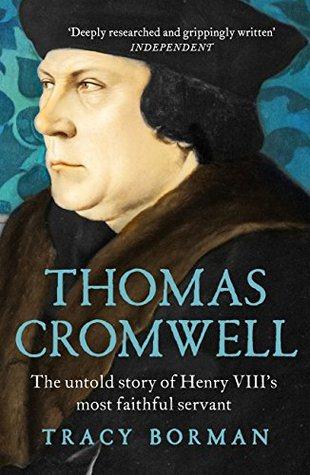
As if my terrible Thomas Cromwell crush after reading Wolf Hall and Bring Up the Bodies (which I finished rereading last night and can confirm is still very much one of the greatest books that I have ever read) wasn’t already bad enough, it seems to have increased ten fold lately thanks to the BBC version of the novels, which ends this week (woe and lamenting), in which Cromwell is played with superlative skill and panache by Mark Rylance. I really wasn’t sure about Rylance at first as he seemed to me to be lacking Cromwell’s trade mark bulk and murderous visage, but I’ve fallen head over heels for him since then and can’t imagine anyone else in the role any more. More on all of that later this week though when Wolf Hall ends and I return with my concluding thoughts on the series (spoiler – it’s probably the best thing that I have ever seen on television, EVER).
Today, though, I am going to talk about Tracy Borman’s superb Thomas Cromwell: The Untold Story of Henry VIII’s Most Faithful Servant, which offers an excellent counterpoint to Mantel’s groundbreaking novels. Even at the very height of Tudor Fever a few years ago, I don’t think many people would have wanted to tackle a book about Henry’s reputedly villainous right hand man, preferring instead flimsy books about his wives, mistresses and other more glamorous figures of that glittering, bloody age. The fact that Tudor Fever has also made a heroine for our times of Anne Boleyn (thanks to Natalie Dormer’s superb turn in The Tudors no doubt), has also counted against Cromwell in the eyes of many, thanks to his being seen as her Machiavellian, scheming nemesis who worked his dark arts behind the scenes and exploited idle court tittle tattle in order to bring her down. This is a shame as Cromwell, as Tracy Borman’s book vividly illustrates, is worth much more attention than he gets and, furthermore, more than holds his own against any of the more alluringly charismatic figures of his age. Yes, even Anne Boleyn, although of course that he was ultimately able to hold his own against her really does go without saying, although the struggle between them is reminiscent of that between Robespierre and Danton, which is also so memorable portrayed by Mantel in her magnificent A Place of Greater Safety (there are in fact many parallels between Wolf Hall and A Place of Greater Safety, not least how similar their central characters, Cromwell and Danton are). And there too, the apparent victor will shortly afterwards follow the other to the scaffold.
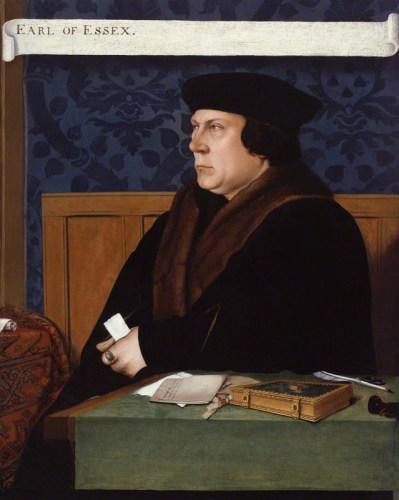
Thomas Cromwell, Earl of Essex, after Hans Holbein, early 17th century copy of the c1532 original. Photo: National Portrait Gallery, London.
I had the pleasure of meeting Tracy at a recent press event at Hampton Court Palace and was pleased to discover that not only does she share my love of The Tudors (we agreed that the mesmerising can’t-take-your-eyes-off-him athleticism of Rhys Meyers really captured the essence of the young Henry and that for all the complaints about over the top playing fast and loose with the facts, it’s actually amazing how much BORING Tudor admin stuff is crammed in too – a bit like the trade agreements bits of the Star Wars films, yawn), but she’s also another admirer of Thomas Cromwell. Even before I read Wolf Hall, I had my suspicions that the traditional depiction of Cromwell, the black clad, oily lawyer, wasn’t quite accurate thanks to picking up on his close relationship with his son, his bustling household (history books seemed full of references to people who had been trained up by him, suggesting a man who took a great interest in the prospects and education of the young) and those letters of appeal from various court ladies, such as the beleaguered Mary and Jane Boleyn. Would they have approached him in such a candid and heartfelt way if he was really the black hearted killer of Queens and arch schemer of popular imagining? I didn’t think so.
It’s not all rose petals and love poems though, of course it’s not. This was the Tudor age after all and, like Friday night at your local nightclub, I don’t think many people come out of it looking all that good. Mantel’s prose lures you along Cromwell’s path with crumbs of his philanthropy, warm good nature, wit and kindness until you find yourself excusing his schemings as all fair in the game of (Tudor) thrones because, after all, as the wraith of Wolsey keeps reminding him in his dreams: ‘I didn’t get the king a new wife. And now I’m dead.’ Tracy Borman, however, takes a much more strident approach to Cromwell’s failings as after all, you can’t really get around the fact that he was instrumental in the downfall and executions of rather a lot of people and Tracy Borman, although she is obviously as much of a Cromwell fan as any of us, to her credit, doesn’t shirk from this fact but instead presents the reasons WHY Cromwell acted as he did, especially in 1536. The crux being that Cromwell, unlike a lot of people from his period was able to learn from the mistakes of others – he’d seen first hand what happened to people who failed Henry or, worse, opposed his will, and was determined not to go the same way.
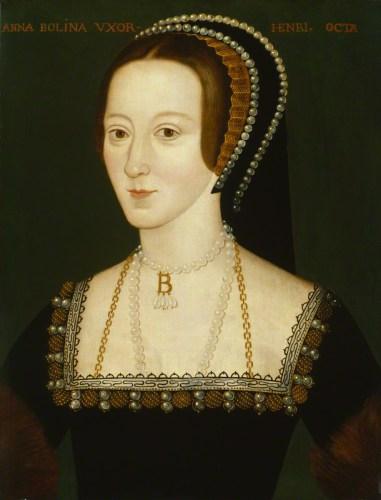
Anne Boleyn, unknown artist, late sixteenth century copy of a lost contemporary original. Photo: National Portrait Gallery, London. I have the line ‘It’s a pleasure to see Anne think’ running through my head now after re-reading Bring up the Bodies.
The other thing, I suppose, is that although we, today, have made a hero of Cromwell, we have to remember that advanced and ahead of his times (just look at his enlightened social reforms for instance) though he undoubtedly was, he was still a product of his own brutal era, where life expectancy was short, life was hard and the King and court were the center of all the realm’s power, although Cromwell, with his legal brain and political acumen, did his best to give more power to parliament (a job that was taken over, ironically, by his relative, Oliver a century after his execution in 1540). Tracy Borman subtly reinforces this with the use of original untranslated text in her book, which is possibly hard going for readers unused to the idiosyncrasies of sixteenth century spelling and phrasing, but serves as a reminder of the actual distance between us and the fact that she is writing about people who lived almost five hundred years ago and so really we can’t impose our own beliefs and principles upon them.
However, while Thomas Cromwell is undoubtedly a product of his own age, could he have been a product of ours? I found myself mulling this over quite a lot while reading Tracy Borman’s book. Cromwell was, after all, the low born son of a blacksmith and brewer, who often found himself on the wrong side of the law and didn’t have the same benefits of formal education as his higher born peers and rivals. Like Anne Boleyn he went off to the Continent as a youth and there acquired for himself an education, interest in the arts and veneer of politesse but unlike her, he picked it up on battlefields and in counting houses, banks and mercantile circles rather than the chic surroundings of the French court. Many of his contemporaries were both astounded and rather appalled that a man with such a dubious background and with such obviously lower class origins could have clambered up so high as to become Henry VIII’s right hand man and one of the wealthiest land owners in the country as well as, eventually and for all too short a time, a peer of the realm. It’s obvious that Cromwell owed all of this to his own sharp intelligence and extraordinary abilities, but would a boy of his background and with his lack of early opportunity ever rise so high today? Sadly, I think not and that makes me wonder all sorts of things, none of them good, about our own society today.
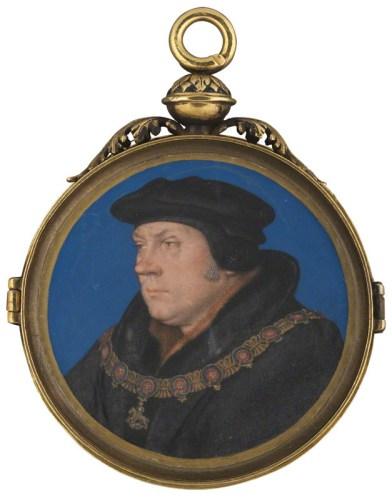
Thomas Cromwell, Earl of Essex, studio of Hans Holbein, c1537. Photo: National Portrait Gallery, London.
‘What Would Thomas Cromwell Do?’ has recently replaced ‘What Would Courtney Love Do?’ as my personal mantra, but to be honest whereas following the imaginary dictates of Ms Love would probably get me arrested most of the time, obeying the advice of Cromwell, would most likely get me stabbed in a dark alley. Although it did amuse me yesterday when I had a bit of a complain on Twitter about the, in my opinion, excessive cost of visiting Westminster Abbey and found myself chuckling away at what Thomas Cromwell would say and do if he knew about it. Oh, there’d be blood on the hallowed flagstones and no mistake. If I also told him that there was genuinely no way a working class child from a house in Putney would get to be the chief minister in our modern and allegedly more enlightened and equal age, he’d probably adopt every single one of them and damn well make SURE that it happened and that, I think, is why I love him so much.
In summary, if you love Wolf Hall and Bring up the Bodies (and are DESPERATE for the release of The Mirror and the Light – I’m also desperate for the release of The Winds of Winter by George RR Martin too, I’m basically a nervous wreck right now) then you really need to read this scholarly, fascinating and intriguing look at the life of Thomas Cromwell, which offers some sharp and illuminating insight into his controversial career.
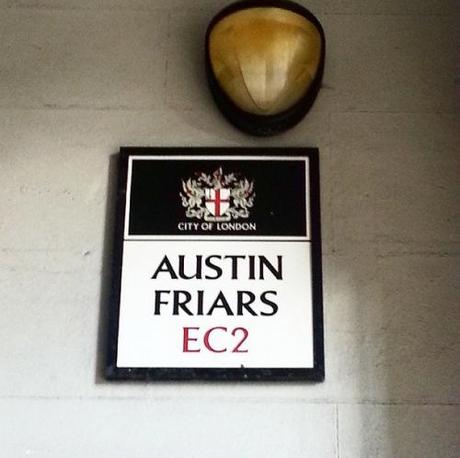
As an aside, I went to London yesterday for a preview of the new series of Poldark (and a Q&A with Aidan Turner!) but took a detour to pay my respects to Austin Friars. The street itself still exists and, of course, it’s still in the center of the hum and bustle of the City as it was in the sixteenth century, but there’s no discernible vestiges left of Cromwell’s opulent mansion where much of Wolf Hall is set.
******
I don’t have adverts or anything like that on my blog and rely on book sales to keep it all going and help pay for the cool stuff that I feature on here so I’d like to say THANK YOU SO MUCH to everyone who buys even just one copy because you are helping keeping this blog alive and supporting a starving author while I churn out more books about posh doom and woe in the past! Thanks!
Set against the infamous Jack the Ripper murders of autumn 1888 and based on the author’s own family history, From Whitechapel is a dark and sumptuous tale of bittersweet love, friendship, loss and redemption and is available NOW from Amazon UK, Amazon US and Burning Eye.
‘Frothy, light hearted, gorgeous. The perfect summer read.’ Minette, my young adult novel of 17th century posh doom and intrigue is available from Amazon UK and Amazon US and is CHEAP AS CHIPS as we like to say in dear old Blighty.
Follow me on Instagram.
